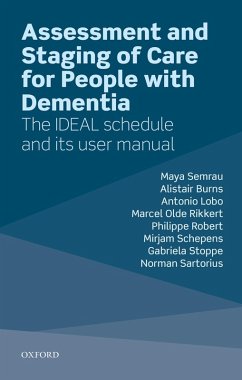Assessment and Staging of Care for Dementia: The IDEAL schedule and its user manual is a unique resource containing a global clinical staging schedule for dementia alongside essential, practical information on how to use it. The International Schedule for the Integrated Assessment and Staging of Care for Dementia (IDEAL) schedule assesses a patient's capacity to function in seven domains. These domains are 'activities of daily living', 'physical health', 'cognitive functioning', 'behavioural and psychological symptoms', 'social support', 'informal care', and 'formal professional care'. Each domain has a set of anchor points to assist with rating the different dimensions appropriately along with critical information on how to calculate the total sum score on the IDEAL schedule. In addition to the IDEAL schedule itself, this resource includes a glossary of key terms and guidance on recommended priorities for interventions for different symptoms and severity patterns. Global examples of how to apply the schedule based on different levels of resources and experience are also presented along with relatable case studies mapped directly to the schedule. Created by the International Dementia Alliance, this innovative tool and user manual is suitable for health care professionals with experience in the diagnosis and treatment of people with dementia around the world, as well as any of those involved in dementia care.
Dieser Download kann aus rechtlichen Gründen nur mit Rechnungsadresse in A, B, BG, CY, CZ, D, DK, EW, E, FIN, F, GR, HR, H, IRL, I, LT, L, LR, M, NL, PL, P, R, S, SLO, SK ausgeliefert werden.
Hinweis: Dieser Artikel kann nur an eine deutsche Lieferadresse ausgeliefert werden.









